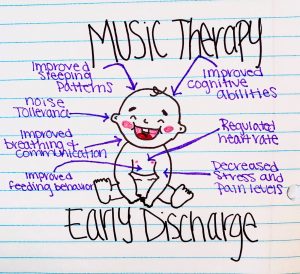Most people listen to music often. There are many types of music, for example it can be songs or noises, such as breathing. Most people know that music can provide feelings of intense pleasure or euphoria and reveal memories. Yet, it isn’t addictive like drugs. Nevertheless, music may be involved in the brain’s natural reward system. Research has been done to try to reveal what is going on in the brain when one listens and/or conducts music. Results have shown promising evidence that music can be beneficial to people, including premature babies.
In The Brain
First, it is important to understand what is going on in the brain. When listening to music the brain releases dopamine in places such as the VTA and NAc just like addictive drugs do. This dopamine being released can relieve stress and anxiety, as well as reduce pain. Music also improves social interactions. It provides a setting for people to get together and interact with one another, whether they are making or listening to the music. Not only does it improve one’s social life, but music reduces stress and anxiety by releasing oxytocin and vasopressin (neurochemicals that maintain positive feelings and reduce stress levels) creating an enhanced mood. Contentedness and enhanced mood creates a form of homeostasis, which is related to a decrease in inflammation, improved immune function, and overall leads to a healthier life.
Music leads to a healthier life because it decreases inflammation, stress and anxiety, and improves immune function. But it also modulates brainstem-mediated measures including: heart-rate, pulse, blood pressure, body temperature, skin conductance, and muscle tension. The effects are largely controlled by tempo and frequency. Lastly, music alone can also be used as a great distraction from physical and emotional feelings, as well as create an outlet for people to release their emotions.

Music Therapy in the NICU
There are two types of music therapy used with premature babies in the neonatal intensive care unit (NICU): Recorded Music and Live Music. This music includes breathing sounds, heartbeat sounds, and lullaby’s. Research has shown music therapy has many benefits for premature babies including improved: sensory skills, communication skills, cognitive abilities, and overall health.
Sensory skills improve because, parents are holding their baby while listening to music/singing which provides time for skin-to-skin contact. During this process, the baby is building stimulation tolerance to noise. This is important because it allows for de-stress by blocking out noise and alarms from NUCI equipment. Second, communication skills form when parents are able to bond with their baby though holding them and soothing them while the music is playing. When music intervention includes parents, it helps build a physical attachment between the baby and parent, resulting in positive involvement.
Next, music therapy has been shown to improve cognitive abilities for babies later in life by increasing their attention span and allowing for self-regulation of emotions and behaviors. Lastly, premature babies overall health has been shown to improve due to music therapy because music therapy may improve feeding behavior, normalize heart-rate, normalize breathing and sleeping patterns, as well as decrease stress and pain levels.
Overall, more research needs to be done, because there is little research that has been conducted on music and the brain. Although, the little research we do have shows many benefits to music therapy. Music therapy should be conducted by a trained professional to prevent the baby from becoming overstimulated. If done correctly, due to all the benefits, babies are often able to be discharged from the hospital earlier than babies who did not receive the music therapy.
